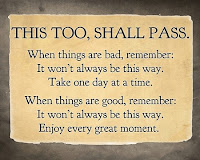 |
| A poster from the conference. |
As we went around introducing ourselves at the beginning of our meeting, I was struck by one member's approach: after saying his name, he went on, "I'm a person who stutters. Sometimes I stutter less. Sometimes I stutter more. Today, we'll see." It's such a concise way to put it and captures so well what it's like to be a person who stutters.
Before introductions we read
Welcoming Words as a group, and afterwards we did two exercises. First, we listed two things we stutter on all the time. Some people had sounds or words that often gave them difficulty--
b's and
p's, words with
v in the middle, or words like
burrito, design, little. For others it was particular situations where they tended to get stuck: the classic one of having to introduce yourself, or of saying what your occupation is. It was interesting to see the common threads and the differences.
The other exercise we did was to graph our speech experiences, bad and good, on a timeline from birth to now and, into the future, our hope for how our speech will evolve. Many of our most negative experiences clustered around our school years, and the most positive ones around the time we decided, as adults, not to hide our stutter and/or to seek speech therapy.
At the end of the meeting, two group members talked about their experience at the NSA conference last week. One attended with his teenage daughter and told us about a parent's perspective. He also gave a summary of a workshop where dealing with stuttering was compared with running a small business. Success in both is not a straight line of steady progress, but ups and downs that move gradually towards the desired goal.
The other member (me) described how the conference is a "charmed" place where stuttering is no big deal and everyone talks freely--people come up to you and introduce themselves without hesitation, and keep eye contact while stuttering. As a result, you stop paying attention to
how people talk and focus on
what they say. You find that people who stutter are funny, intelligent, and charming. You realize that it's possible to be an interesting and successful person even if you stutter. Stuttering doesn't have to eclipse everything else that you are.
Attending the conference was a difficult experience at times--intense, overwhelming, emotionally draining. But I came away from it with knowledge about myself and stuttering that I don't think can be gained anywhere else. The conference is something you have to experience for yourself at least once in your life. There's nothing like seeing with your own eyes that you shouldn't hide your light under a bushel because you stutter. And there's nothing like realizing how brightly and beautifully that light can shine when you let it.


















